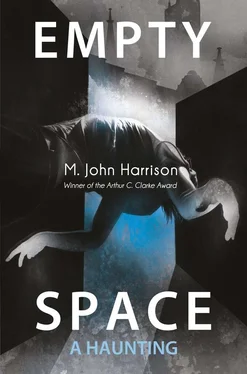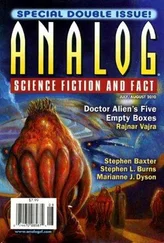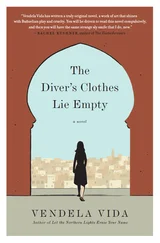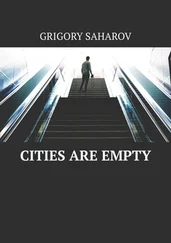She picked up the phone.
‘Anna!’ she greeted Anna’s answering service. ‘Look, I’ve got some exciting news. I went to see Brian Tate yesterday. He’s still alive. Still living in the same house in North London. He’s been teaching physics at a school in Walthamstow for thirty years. He’s reluctant to talk to me about what happened, of course. That’s understandable. But I think he might talk to you. Anna, I think it would do you the world of good to talk to someone else who knew Michael —’
There was a dull clattering sound at the other end of the line, and a half-familar voice said:
‘Hello? Hello? Who’s this?’
‘Anna,’ said the doctor. ‘I’m so relieved! I thought —’
‘It’s not Anna,’ said the voice, ‘it’s her daughter.’ There was a pause. ‘I’m sorry, but Anna’s dead.’
Helen Alpert stared at the phone.
‘Oh dear,’ she said. She couldn’t think what to add. ‘Oh dear, I’m sorry about that. Is this Marnie?’ She couldn’t remember if there was another daughter. All she could remember about Anna’s relationship with Marnie was its elegantly unconscious symmetries. Anna, constructing the daughter as a failed adult, had defused Marnie’s early sexuality by pressing upon her the role of dowdy, unfulfilled helper; later this had encouraged Marnie to treat her mother as an ageing child whose narcissistic demands were a burden. ‘I’m very sorry to hear that,’ she said again.
‘It was a stroke,’ Marnie said. After a pause, she added: ‘Was there something? I’m quite busy at the moment.’
‘No, no. It doesn’t matter.’
‘Do send your bill, won’t you?’ Marnie said.
Helen Alpert said she would.
At the age of six Marnie Waterman wanted to be married. She believed this would happen when she was twenty-one, as the inevitable consequence of reaching that age. She would also have horses and drive a car. Another inevitable consequence was: she would be tall. Though she had no plan for bringing it about, the future seemed already there for her, a dreamy thing with pre-loaded contents. At seven she said to anyone who asked: ‘I’ll cer tainly travel.’ Ten years old saw her adding an image of herself in blocked pink satin shoes; although this, out of shyness, she kept private. Around that time the Chinese economy collapsed and everything else went with it. Media dubbed it ‘the perfect storm’. Like most of the other fathers in Wyndlesham, Tim Waterman had put up the hurricane shutters a year or two in advance. They were one of the lucky families, he explained when Marnie was thirteen: nevertheless a lot of things fell out of her future around then. Outside Wyndlesham, stagflation wrote itself over everything like graffiti. Peak oil had come and gone. No one knew how to blow the next bubble. The financial sector, stunned by the discovery that money had been as postmodernised as everything else, passively allowed the state to clip its wings. Bankers seeking explanations read Baudrillard forty years too late. Bonuses tanked. A few footsoldiers got jobs in the remaining heartlands of the industry, where they found competition fierce. Families like Marnie’s still drove everywhere, but their Range Rovers and Audis went unreplaced year on year; and though their incomes remained good they felt hard-up. Adults were forced to find new ways of viewing the idea of success; children were having to mature earlier. Some of them felt resentful about that. Sharp divisions appeared at the upper end of the middle class. Suddenly your parents could afford the Wyndlesham cheese shop or they couldn’t: Marnie’s cohort found itself defined by this. In her mid-to-late teens Marnie revised the contents of the future, but she still expected it to bring itself about. Meanwhile, her father began to look tired, then died without warning of pancreatic cancer. Luckily he’d protected the family from that too. Marnie, nineteen and a half, came home to the funeral by train — a long, grinding journey through a landscape composed of empty industrial estates and abandoned parking structures — to find Anna sad but also frisky. They spoke about how free she felt, but it turned out she hadn’t made any plans either. All that time, Marnie had been doing well at a good university, though when her twenty-first birthday arrived she turned out not to be married after all; towards the end of graduation year she accepted a job offer from one of the emerging mutual associations.
Looking back on it all now, she felt that so far her life had been demanding but satisfactory. Women only ten years older than her, encouraged to remain adolescent until they were thirty, had failed to make the transition from the liquid world: they seemed brittle when they had what they wanted, spoiled and bitter when they didn’t. The younger ones, struggling to avoid the underclass enclaves of Eastbourne and Hastings, were simply worn down. At twenty-eight, by contrast, Marnie had charge of herself. Though money was no longer a serious career, ‘the New Economics’ — cautious, simplified and heavily shifted to the co-operative — brought her security. A single mother since her last year at uni, she found herself able to rent a small house well away from the chaotic suburbs; her employer financed childcare until Enny Mae was five, then a nice school. Marnie could afford medical insurance. She still saw Enny Mae’s father, a man called William. Once or twice a year they had a talk. They were making sure that whatever future the little girl imagined for herself, a plan was put in place for achieving it. Anna, recognising Enny Mae as competition, had never shown much interest; to avoid fractiousness and tantrums, Marnie had learned to keep them apart.
That was how things had rested until this morning.
Marnie put the phone down on Helen Alpert, stared out of the window of the Coldmorton Lane house, which she supposed was now hers, and wondered what would happen next. She had woken eager to share her test results with Anna, suddenly able to feel happy after the inexplicable anxiety-states of the night before (in which relief at being cancer-free was somehow overpowered by the dread of a completely new future — one into which the possibility of cancer had now been firmly embedded): but Anna had somehow evaded her again, deftly remaining the absent parent to the end. Marnie felt weightless. It was too early to collect Enny Mae from school; to obviate further changes in his lifestyle, James the cat had eaten hastily and hidden himself under a wardrobe. Marnie washed Anna’s supper things at the sink — there was a dishwasher but she couldn’t bring herself to run it — then wandered around the living area. Anna still owned books. In them, the self figured largely: self-help books of thirty years ago, novels about women finding themselves, a book of photographs entitled Events of the Self ; even books by a man calling himself Self. She turned on the TV — found only news of the Indian reoccupation of Pakistan — turned it off again.
Ten or fifteen minutes later, she caught someone hanging about in the garden. He was a boy of about sixteen, somewhat shorter than Marnie, dressed in tight grey jeans rolled halfway up his calves. His white T-shirt was too small for him, his black lace-up boots were covered in hardened dribbles and spots of yellow and pink enamel paint. With him he had a small dog, a kind of long-legged Border terrier, sand-coloured, with short, bristly hair and scruffy-looking ears. Boy and dog stood in the middle of the lawn. Both of them seemed fascinated by the wreckage of the summerhouse.
Marnie rapped on the window.
‘Excuse me,’ she called. ‘Excuse me! Can I help you?’
He didn’t seem to hear. Marnie went out on to the lawn and marched up behind him. ‘Excuse me!’ she called again, perhaps more loudly than she had intended. ‘Do you mind if I ask what you’re doing here?’
Читать дальше












